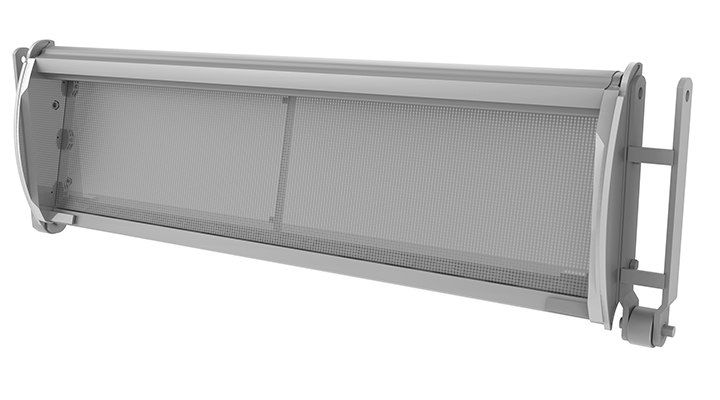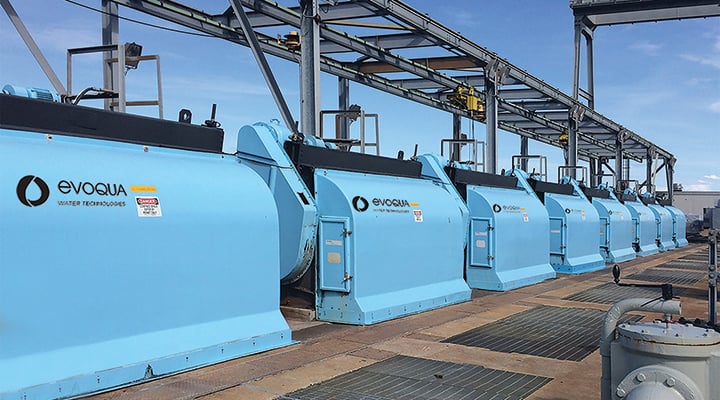With regulatory pressure to shutdown coal-powered energy production plants growing, there are several coal-powered plants retiring or converting to natural gas in the next two years. A power plant located in the southern United States needed to replace its traveling water screens as the plant was retiring two of its three coal-powered units and converting the last to natural gas. At the same time, it was building a new combined cycle gas powerplant behind the retiring plant.
Challenge
Originally installed in 1949, the existing traveling water screens at the plant were dated. The plant needed more modern screens for its new, more efficient plant and needed to purchase them within their budget and using the plant’s existing infrastructure. While the converted power plant required less water as it no longer needed cooling water, it still required water for processing fire water purposes.
Making the project more complex, the plant was still operating during installation providing backup power to the new combined cycle gas plant. This meant that two of the three screens needed to remain in operation at all times. The project also needed to be completed within 6 months so that the plant was fully operational by the end of that calendar year.

Solution
After receiving a glowing recommendation from another plant within their company the plant hired Evoqua Water Technologies to replace the intake screens. Evoqua’s traveling water screens provided more modern, maintenance friendly screens to the converted coal-powered plant.
The water screens have a capacity of 46,000 gallons per minute of water with baskets measuring 9’ by 2’ and rotate on a screen measuring 29’ from the headshaft to the boot. Evoqua’s non-metallic baskets add significant value as they are 50% lighter and therefore don’t use as much energy or require as much maintenance. Additionally, Evoqua’s traveling water screens fit into the same exact channel as the plant’s existing screens.
Evoqua partnered closely with Underwater Construction Corporation (UCC) and the plant on installation. The existing screens were corroded and therefore difficult to remove. Making the installation more complex was the tight configuration in the building housing the intake screens. As a result of limited access to screens, the screens had to be removed in pieces. Once removed, the new screens were sub-assembled in sections and a crane was needed to lower portions of the screen into the intake building. Another crane was located in the intake building to lower screens into place. Due to the plant’s tight deadline, Evoqua used two crews working two 10-hour shifts back-to-back to accelerate installation. Despite these complications, the installation team was able to keep pace and complete the project on schedule.
Additionally, the plant needed to keep two of the three screens operational at all times. To accommodate this, the Evoqua team coordinated deliveries and installation to make sure two of the water screens could be continuously running.
Results
Evoqua was able to quote the plant screens at a price within their budget, provide the plant with more modern equipment, and complete the project on schedule. The speed of installation was particularly important to this plant. The customer began inquiring about this project in June and by December Evoqua was able to complete the design, assembly, and installation of all three water screens. Evoqua reacted quickly and provided a quality solution within the customer’s 6-month deadline while also remaining within budget.
Evoqua’s screens successfully bring in water from a nearby river and filters out debris that might damage the power plant’s equipment. Evoqua’s screens have provided the plant with more modern equipment to support their converted coal to natural gas power plant. The screens Evoqua installed represent the new standard for modern intake screens. The screens are designed to be low maintenance and energy efficient, lowering the plant’s operational and life cycle costs. Lighter baskets will result in less wear and tear on screen components, require less power to rotate the screens, and reduce the amount of moving parts submerged underwater. Additionally, Evoqua’s debris baskets are made of high-strength composite (HSC) material that is corrosion-resistant to keep them sturdy and long-lasting while the non-lube chain further reduces maintenance time and costs. Evoqua’s modern equipment will ultimately reduce the plant’s operational and life cycle costs.


